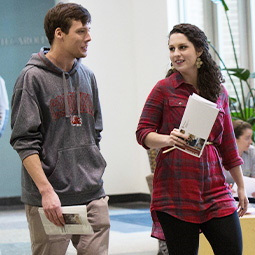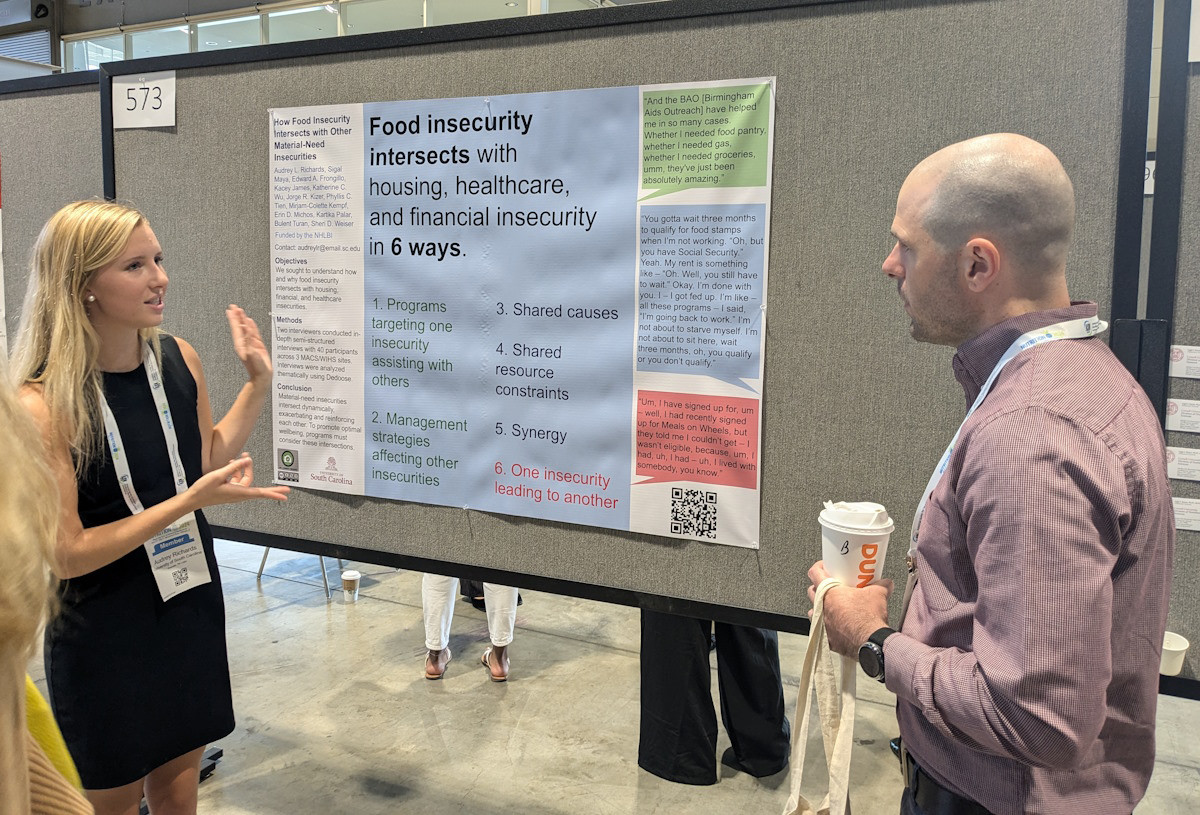
Study Public Health
The Bachelor of Arts (B.A.) curriculum is for students who want to apply the degree to social and behavioral sciences, while the Bachelor of Science (B.S.) is for students who are interested in a broad-based natural science.
August 26, 2024 | Erin Bluvas, bluvase@sc.edu
Audrey Richards’ major may be one-of-a-kind, but she’s been anything but alone in her undergraduate experience. The rising senior is a McNair Scholar and an Honors College student, who spent two years as a public health major before customizing her curriculum even further through the Build Your Own Major (BARSC) program.
Richards will not only have the words “Food Policy and Research” on her diploma when she graduates next May, she’ll have the expertise to pursue a career in the field. It all began when she was a high school student in Knoxville, Tennessee. Richards had heard about the Arnold School of Public Health and felt like it might be a good place for her to learn about the health care field.
“I loved that the Arnold School has six distinct departments with faculty doing fascinating research,” she says. “I felt this would give me a great opportunity to explore health and health care from different perspectives and to learn about public health both in and out of the classroom by contributing to research projects.”
After finding out how to look through the university’s research database to learn more about faculty interests (thanks to a session offered by the Office of Undergraduate Research), Richards discovered the Nutrition Consortium and found her interest piqued after watching a video of health promotion education and behavior professor Edward Frongillo talking about his research in food insecurity.
Her McNair Scholar mentor, health services policy and management associate professor Christina Andrews, made introductions and the two met to discuss past research projects and future opportunities. Just a few weeks into her freshman year, Richards joined Frongillo’s research team – investigating the benefits of interventions such as school backpack programs in underserved areas.
“I am so grateful that I pushed my nerves and feelings of incompetency to the side and reached out,” Richards says. “Dr. Frongillo has invested so much in me as a mentee. My college experience, passions and future career path would be completely different if I had not taken the jump.”

Over the past three years, her research skills have grown to the point where she has secured her own funding through the Honors College and recently published a paper as first author in BMJ Open. Led by Richards, the study found that recurring data collections from caregivers of young children in Kenya can act as an intervention. She is currently leading the qualitative analysis of a multi-city, NIH-funded project on the intersection of insecurities (e.g., housing, financial, health care, and food) and their impacts on health outcomes such as HIV and cardiovascular disease.
Richards’ research experience has been enhanced by her Food Policy and Research major. The BARSC program has enabled her to focus on the nutrition sector of public health while also learning research methods she can apply to her work with Frongillo and the Nutrition Consortium. The policy classes have helped her understand how to interpret and implement food and nutrition policy.
“Through each project, I have learned that I like evaluation more than program planning, and I love any chance to conduct or listen to participant interviews,” says Richards, who sees graduate school in her future. “I also learned that research is so much more than data collection, analysis and paper writing. There is so much teamwork, communication, logistics, and creative problem solving. Being involved in research has allowed me to think more critically and expand on these skills, thus preparing me for a future career in nutrition and resource insecurity research.”
She also notes the importance of networking opportunities through collaborations and research conferences. Richards says that talking with professionals in the field has helped her better understand her career options.
“I would recommend anyone interested in getting involved with research take the leap to get involved and do not fear a challenge,” she advises other students. “If you are already involved in research, push yourself to attend a conference and explore funding options through the school.”

The Bachelor of Arts (B.A.) curriculum is for students who want to apply the degree to social and behavioral sciences, while the Bachelor of Science (B.S.) is for students who are interested in a broad-based natural science.

The Nutrition Consortium is comprised of outstanding interdisciplinary scholars and stakeholders engaged in meaningful research and transformational activities in the field of nutrition. Researchers in the Consortium work to understand how nutritional components interact with a variety of contexts, including political, physical, economic, and social structures.